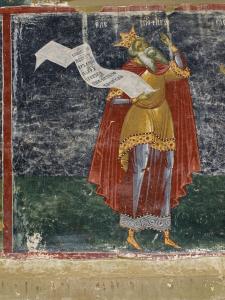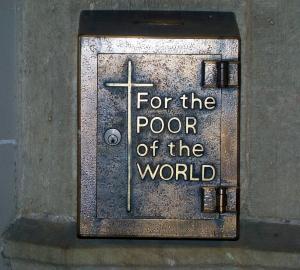In the ante-Nicene era, Christians and pagans both took notice of the words of Jesus concerning the rich and the poor. In Luke, we find his message summarized in two statements: “Blessed are you poor, for yours is the kingdom of God” (Lk. 6:20v RSV). “But woe to you that are rich, for you have received your consolation” (Lk. 6:24 RSV).

For many pagans, it was words like these which they believe explained why many of the underclass became Christian. But they also felt, Jesus, and Christians following him, did sometimes appeal to the rich, especially vulnerable women, conning them into giving over their riches to the church, making them in this way one with the poor. Christianity was looked down upon by many of the Roman elite as being a worthless religion for it sought after the underclass and the naïve.
Perhaps no greater example of this could be found than in the story concerning the rich young man who came to ask Jesus what he should do to have eternal life:
And behold, one came up to him, saying, “Teacher, what good deed must I do, to have eternal life?” And he said to him, “Why do you ask me about what is good? One there is who is good. If you would enter life, keep the commandments.” He said to him, “Which?” And Jesus said, “You shall not kill, You shall not commit adultery, You shall not steal, You shall not bear false witness, Honor your father and mother, and, You shall love your neighbor as yourself.” The young man said to him, “All these I have observed; what do I still lack?” Jesus said to him, “If you would be perfect, go, sell what you possess and give to the poor, and you will have treasure in heaven; and come, follow me.” When the young man heard this he went away sorrowful; for he had great possessions.
And Jesus said to his disciples, “Truly, I say to you, it will be hard for a rich man to enter the kingdom of heaven. Again I tell you, it is easier for a camel to go through the eye of a needle than for a rich man to enter the kingdom of God” (Matt. 19:16-24 RSV).
From these words, pagan critics suggested the true reality of the Christian faith could be observed. It was filled with low-life people on the dole who used religion for their own advantage. To do this right, they suggested an odd reversal of fortunes: those blessed with riches were treated as truly unfortunate, indeed, as if they were to be cursed. Those with riches, then, were told to hand over all their money if they did not want to experience the wrath of God. The Christian faith appealed to the poor, lazy, wretches of society, and those who were easily duped among the rich. It was worthy of ridicule, and those who might for some reason feel attracted to the faith should examine it with critical eyes, and in doing so, see how dishonorable it really is. Thus, the early Christian (3rd century) writer, Macarius, recorded a common pagan criticism of the Christian faith (which many scholars think came directly or indirectly from Porphyry’s Against the Christians):
It seems therefore to me that these statements are not Christ’s, if, that is, he taught the Rule of Truth, but of some poor men wishing to take the property of the wealthy with vain talk. One must acknowledge that today, not long ago, these words – “Sell your property and give to the poor and you will have a treasure-house in heaven” – when read to noble women persuaded them to distribute all their wealth and property to the poor and, when they themselves became needy, to ask to be put on the dole, passing from a state of freedom to unseemly begging, from well-being to a pitiable mien, and final, they found it necessary to go to the homes of those who have [wealth]. This is the first, or rather the highest outrage and calamity – that they should flee from their own property on the pretext of piety and then beg from others because of the necessity of their want. It seems to me that these are the utterances of a sick woman.[1]
Much of this criticism seems similar to the way many critics of social justice reads social justice today. If people are expected to give to help those in need, all will be in need; society will become a “welfare state” where those who once were self-sufficient with their wealth will be left “on the dole” with everyone else. In this way, those how argue against social justice, those who argue against the needs of the poor in preference of the rich, not only go against the preferential option of the poor (and vulnerable) demonstrated in the teachings of Jesus, they affirm the anti-Christian bias of the rich and the power and authority of the rich over the common good.
The early Christian faith knew and understood the value and dignity of the poor, but contrary to the image held by many pagan critics, this did not mean all Christians were from the underclass or uneducated. What the Christian faith did was promote the poor, affirming their equality with the rich by pointing out that possessing wealth does not make someone of value. James, speaking of this, said Christians should show no favoritism to the rich (cf. Jas. 2:1-9), but in doing so, that meant Christians must accept the poor amongst them and not look down upon them because of their social class. This is why Christianity became known to be a religion of the poor, not because it was exclusively poor, but because the poor were respected, and sometimes even, understood to be more honorable than those who had wealth (as voluntary poverty became recognized as a good). Christianity relativized the value of temporal wealth and social status, while it created a new way to judge a person’s life by their deeds.
This has always been Christian teaching, but for quite some time, it has been ignored. The rich, like parasites, joined themselves to the church, and through their wealth, helped change the message which was being preached until many came to think riches itself demonstrates God’s favoritism. The words of Jesus, the words of the Apostles in Scripture, the words of the Fathers and saints concerning social justice and issues of wealth and poverty were ignored: and so, many raised in such an environment, came to accept the unjust social structures which the Christian faith fought against since its inception and have come to think this is what the Gospel promotes. Instead of being a faith that radically undermines the value of wealth, instead of a faith that challenges social standing based upon the accidents of life, it has become used to promote the rich and powerful over the needs of the people Jesus came to meet. The poor have become burdened for the sake of the rich, contrary to all sense of justice.

But the truth comes out, as it always does. Pope Francis has caused many to fight against him because he has once again promoted the church as a church of the poor, that is, a church which elevates and recognizes the cries of the poor and works for social justice. Many of those who attack the him are funded by rich elites who feel threatened by the message of the Gospel. They know that many people have not been properly educated about the teachings concerning wealth and poverty in Scripture and in tradition, and so they set the cultural milieu against the teachings of the church, having people believe what they have been raised to accept due to what society teaches is somehow the same moral teachings accepted by the Christian faith.
Pope Francis, following Christ, takes little interest in the words of his harshest critics. His eye is on the teachings of the Christian faith and promoting the elements of it which many have not heard. He keeps pressing forward with his message, the message which he inherited from those who came before him. Thus, in his homily at the close of the Amazon Synod, he reiterated the need to hear the cries of the poor:
In this Synod we have had the grace of listening to the voices of the poor and reflecting on the precariousness of their lives, threatened by predatory models of development. [2]
Likewise, he suggested, we should seek to put ourselves in solidarity with the poor, because, in reality, we are just as needy as they are of God’s grace:
We are a bit [like] tax collectors because we are sinners, and a bit [like] Pharisees because we are presumptuous, able to justify ourselves, masters of the art of self-justification. This may often work with ourselves, but not with God. This trick does not work with God. Let us pray for the grace to experience ourselves in need of mercy, interiorly poor. For this reason too, we do well to associate with the poor, to remind ourselves that we are poor, to remind ourselves that the salvation of God operates only in an atmosphere of interior poverty.[3]
“But we care about the salvation of souls. All of this is secondary.” That is what many of the rich try to suggest to excuse themselves from the message of Christ in the Gospels. However, how can someone be interested in the salvation of souls if they tell us we can ignore the teachings of Christ? Jesus himself said we would be judged based upon how we treat the least among us; if we are concerned about the salvation of souls, we would be concerned about the rich and the fact that they risk perdition based upon their neglect of the poor. Indeed, as St. Salvian explained, following the words of Christ himself, when we consider the poor and needy, we are able to come face to face with Jesus himself, who is poor and needy with them:
Who are they who say that the Lord Jesus Christ does not need the service of our gifts? Behold, He declares that He is hungry, thirsty and cold. Let anyone of them answer, does He not need it, He who complains that He is hungry? Does He not need, He who says that He thirsts? I add something further, Christ not only needs in the company of others, but He needs much more than any others need. In every group of poor men the poverty of all is not alike.[4]
How can we truly care about our salvation if we turn our face away from Jesus when he comes to us in need? Grace perfects nature, but in order for it to do so, we must cooperate with it. We must engage the faith in its fullness. We must accept that Jesus, in the Gospels, presented us a message of social justice, and in doing so, accept the dictates of social justice. We are not faithful if we think we can ignore social justice, or through sophistry, undermine it in such a way to end up promoting the desires of the avaricious rich.
Yes, the Christian faith is not exclusively a faith of the poor. All people are called to the faith. Those who have riches should not be viewed as more honorable or glorious just because they have riches; rather, they are called to use it for the benefit of all:
The possession of present things has this great good, if it assists the life of the poor. Other than this, wealth is a temptation, and it will give greater punishments in the future to the extent that it is greater: “because severe judgment fall on those in high places” (Wis. 6:5).[5]
For critics who view the social order and the value of people according to their wealth, Christianity, authentic Christianity, will always be seen as a thing of the “poor, worthless class” because Christianity honors and promotes the value and needs of the poor. Critics of Pope Francis, critics of the Amazon Synod, coming from within the Christian faith, have more in common with pagan anti-Christian criticism of the faith, and thus with the irredeemable side of pre-Christian culture, than the indigenous cultures which they ridicule and oppress. For, it is clear, their words sound more like the pagan critic in Macarius than they do the Christian who affirms the teachings of Christ. The Christian faith is a faith of the poor, a faith which hears the cries of the poor, for it is a faith which recognizes we are all poor in need of God’s bounty.
[1] Macarius, Apocriticus. Trans. Jeremy M. Schott and Mark J. Edwards (Liverpool: Liverpool University Press, 2015), 110-11.
[2] Pope Francis, Homily At the Mass for the Closing of the Amazon Synod (Oct. 27, 2019). Vatican translation. ¶3.
[3] Pope Francis, Homily At the Mass for the Closing of the Amazon Synod,¶2.
[4] Salvian the Presbyter, “The Four Books of Timothy to the Church” in The Writings of Salvian the Presbyter. Trans. Jeremiah F. O’Sullivan (Washington, DC: CUA Press, 1962), 361.
[5] St. Isidore of Seville, Sententiae. Trans. Thomas L. Knoebel (New York: Newman Press, 2018), 213.
Stay in touch! Like A Little Bit of Nothing on Facebook.
If you liked what you read, please consider sharing it with your friends and family!













